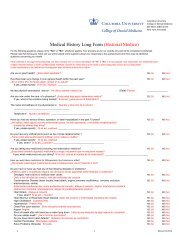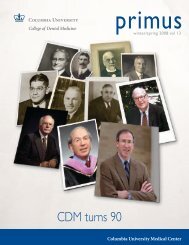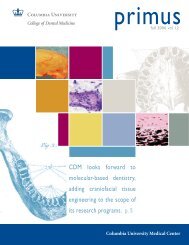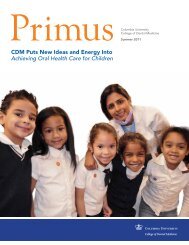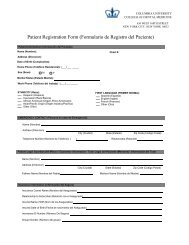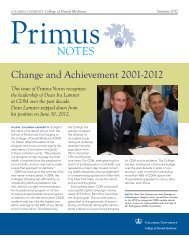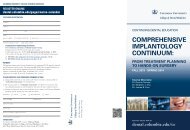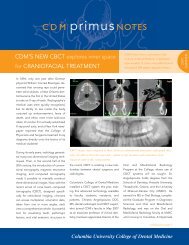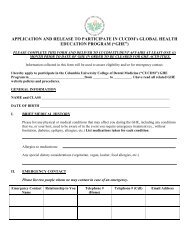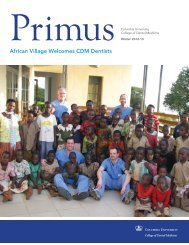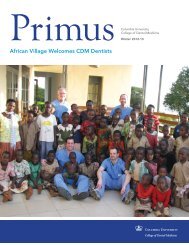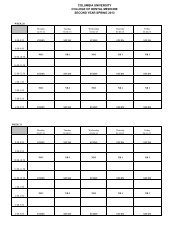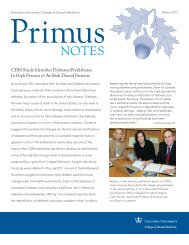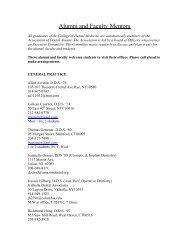Jarvie Journal - College of Dental Medicine - Columbia University
Jarvie Journal - College of Dental Medicine - Columbia University
Jarvie Journal - College of Dental Medicine - Columbia University
You also want an ePaper? Increase the reach of your titles
YUMPU automatically turns print PDFs into web optimized ePapers that Google loves.
Volume 56, Spring 2013<br />
Caries Risk Assessment Utilization by Pediatric and General Dentists<br />
Iva LeRoy 1 , Agelina Paek 2 , Athanasios Zavras 3*<br />
1 <strong>Columbia</strong>-New York Presbyterian Hospital, Residency Program in Pediatric Dentistry, 2, 3 Section <strong>of</strong> Social and<br />
Behavioral Sciences; all within <strong>Columbia</strong> <strong>University</strong> <strong>College</strong> <strong>of</strong> <strong>Dental</strong> <strong>Medicine</strong>, New York, NY; *Faculty Mentor<br />
Introduction: Caries management by risk assessment (CAMBRA) represents an approach to preventing and treating<br />
dental caries. The risk assessment and the emphasis on the whole disease process, not just the cavitated stage <strong>of</strong> lesion<br />
progression, differentiates CAMBRA from the traditional restorative approach in treating dental caries. Furthermore,<br />
CAMBRA attempts to change caries management from the current and predominant one-size-fits-all approach to an<br />
individualized risk-based care. While the evidence indicates management <strong>of</strong> caries by risk assessment is an effective<br />
approach to prevent and treat caries, there is concern that risk assessment has been under-utilized in the clinical<br />
setting.<br />
Objective: This study explores whether pediatric and general dentists utilize two services in caries assessment by risk<br />
assessment: collection <strong>of</strong> microorganisms for culture and sensitivity (D0415) and caries susceptibility tests (D0425).<br />
Specifically, the aim <strong>of</strong> this paper is to assess the percentage <strong>of</strong> general and pediatric dentists who perform D0415 and<br />
D0425 on the pediatric population, the likihood <strong>of</strong> submitting claims for same, and whether the likelihood <strong>of</strong><br />
performing D0415 and D0425 would increase if dentists received insurance reimbursement for these services.<br />
Materials & Methods: Delta <strong>Dental</strong> insurance company (hereinafter “<strong>Dental</strong> <strong>Dental</strong>”) provided data on dental claims<br />
for two services: collection <strong>of</strong> microorganisms for culture and sensitivity (D0415) and caries susceptibility tests<br />
(D0425) submitted between 2008-2011 by general and pediatric dentists for patients under 6 years <strong>of</strong> age in the five<br />
states where they conduct the most business (CA, NY, TX, PA & FL). In addition to the data provided by Delta<br />
<strong>Dental</strong>, general and pediatric dentists were surveyed. A random sample <strong>of</strong> 500 general dentists from Manhattan and<br />
120 pediatric dentists from New York State were selected. All participants were given a questionnaire regarding the<br />
likelihood <strong>of</strong> performing D0415 & D0425 for a hypothetical patient. Pediatric dentists were additionally surveyed<br />
regarding whether the likelihood <strong>of</strong> performing D0415 & D0425 would increase if they received insurance<br />
reimbursement for these services.<br />
Results & Conclusions: When surveyed, the majority <strong>of</strong> general and pediatric dentists (89% and 88%, respectively)<br />
do not take a collection <strong>of</strong> microorganism for culture and sensitivity (D0415). Further, 67% <strong>of</strong> general dentists and<br />
38% pediatric dentists responded that they do not conduct a caries susceptibility test (D0425). Of the pediatric dentists<br />
surveyed who responded that they do perform D0415 and D0425, the majority <strong>of</strong> these dentists do not submit a claim<br />
to an insurance company (86% <strong>of</strong> those performing D0415 and 78% <strong>of</strong> those performing D0425 do not submit<br />
claims). The survey responses are in conformity with the data obtained from Delta <strong>Dental</strong>, which reveals that more<br />
than 99% <strong>of</strong> general and pediatric dentists do not submit insurance claims for D0415 and D0425. However, when<br />
pediatric dentists were surveyed, 67% said they would be more likely to perform D0425 and 59% would be more<br />
likely to perform D0415 if they received insurance reimbursement for those services. The majority <strong>of</strong> respondents<br />
agreed that a reasonable fee for D0415 for culture and sensitivity is ≥$40 and a reasonable fee for D0425 is $30.<br />
Discussion: Survey <strong>of</strong> general and pediatric dentists suggests that there is under-utilization <strong>of</strong> caries risk assessment<br />
services. This, to a degree, reflects a lack <strong>of</strong> monetary incentive as there is both time and cost associated with utilizing<br />
these unreimbursed risk assessment tools. However, this does not diminish the evidence showing that S. mutans<br />
cultures and caries susceptibility testing are promising approaches for identifying children who need early and<br />
intensive intervention to prevent or minimize caries experience.<br />
Research supported by the Health Resources and Services Administration Maternal and Child Health Bureau:<br />
Leadership Training in Pediatric Dentistry Grant T17MC06359<br />
Post-doctoral Training in Pediatric Dentistry Grant D88HP20109<br />
59



